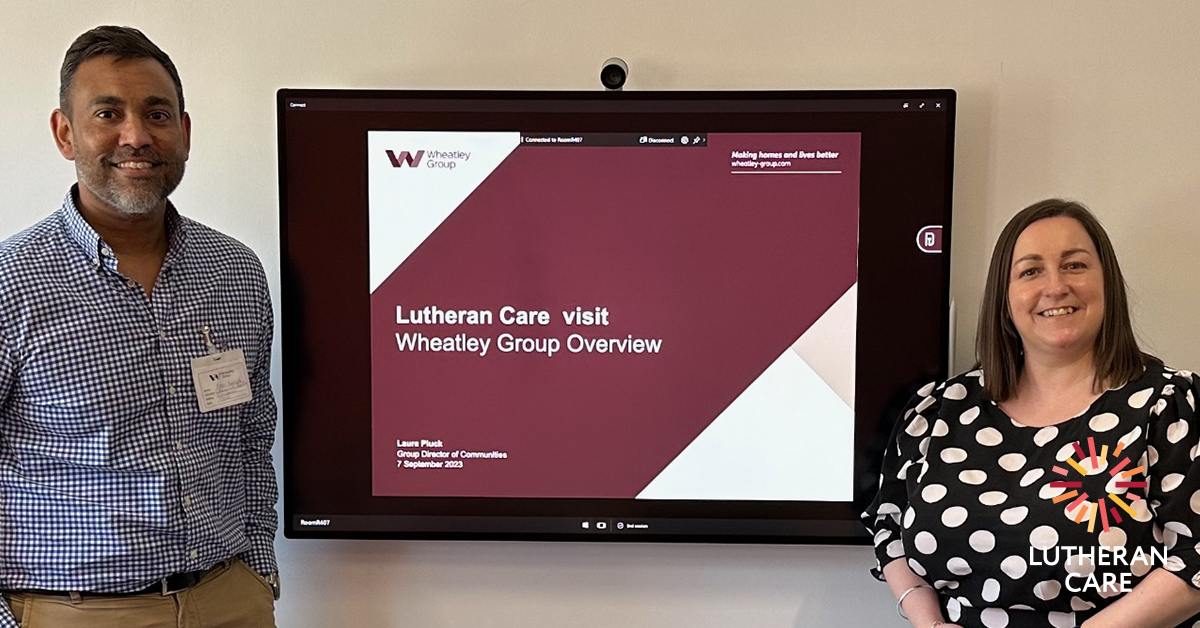In September 2023, Lutheran Care’s Chief Executive Officer Rohan Feegrade travelled to the UK to connect with local government representatives and community service providers in an exchange of learnings. It was a valuable opportunity to discuss localised and global social challenges, efficacies and evolution in funding models and the global issue of growing housing insecurity and cost of living crisis in developed nations.
Rohan shares his reflections on his trip.
It is fair to say that austerity measures and the weight of cost of living stresses has put significant pressures on community service providers over the past few years, making the sector in South Australia a progressively challenging environment to operate in. Exasperated by rising inflation and the scarcity of sustainable social and affordable housing options, service organisations like Lutheran Care strain to deliver essential services to the growing number of people living in poverty, experiencing disadvantage or in crisis.
As the daily living expenses continue to intensify for households and pressurise service provision on our shores, I heard first-hand accounts how this challenge is not unique to Australia. Through the tour, I connected with local governments and service providers to understand the issues at hand and some solutions from both sides. While I heard this through the local lens of a UK context, I discovered similarities and vast differences with each provider I visited. This sharing of experiences and best practice has put me in good stead to explore new concepts and a better way of progressing our advocacy pieces to government here in Australia, starting with greater investment in social and community sectors through government funding, resource allocation and the development of robust shared data systems and metrics.
Over 10 days, I met with a number of key leaders and CEO’s including the Wheatley Group and Simon Community Scotland in the city of Glasgow, followed by the City of London Corporation, Crisis UK, Thames Reach UK and finishing at the Social Outcomes Conference at the University of Oxford. Executives are constantly learning from one another across Australia. Moving forward, collaboration and shared learnings such as this with overseas counterparts must be an important piece in our strategy to stay abreast of a rapidly changing landscape. If we are to broaden our networks to different countries and engage in open dialogue, we can lead our organisation (and possibly the sector) to emerging possibilities of new research, secondments and learning, new service models, philanthropic efforts and partnerships with agencies and audiences at both a national and international level.
During the exchange of information, I was pleased to receive feedback to re-affirm that here at Lutheran Care we do logistics and person centred service delivery well, if not better than many other places in the world. I continue to be proud of these aspects of our organisation, which have been commended to me many times before. We are not afraid to work alongside likeminded organisations, peak bodies, clients and other member-based or representative organisations to extend our service delivery footprint and supportive reach to better care for the most vulnerable people in our society.
When I met with organisations abroad, many had the same ethos and practices that involved people they support in their organisational decision making and co-design of programs. Moving beyond simple consultation toward authentic engagement and integration of the client voice/lived experience at the earliest stages of program design results in the successful buy in, mobility, uptake and number of services on offer. But the most important part of this engagement is that we see better client outcomes.
In our organisation, we remain focused on the people at the centre of the supports we provide. Listening to and acting on client voice is a crucial piece in the ‘why and how’ we provide Lutheran Care programs and crisis relief services to the community. However, I know there is always room for improvement. This coming year in particular, I look forward to the work our teams will undertake to continue refining our approach in engaging stakeholders and those with lived experience to reach better outcomes for our clients. Further to refining and deeply embedding lived experience is a commitment to integrating it in to all areas of service design, delivery and governance.
Along with engaging people in the design of support services, I was interested to hear about the British Government’s evolution of a shared sector-wide data system. They look at data collation as a whole of community approach and are developing a single data system with associated data metrics to form a publically available dashboard. This will both support people and the sector to access, develop and address demand consistently across the UK in real time. Seeing this reminded me that our data collection tools here in Australia are silos of information and questions. Is our sector too inward-thinking in our approach to data collection and reporting? Can we explore sector wide data systems, available to all?
I’m interested to see if this government-led data collaboration project is something we can replicate here. One platform of circular information sharing in a continuous process – from needs assessment through to client support, monitoring, awareness and evaluation, would offer service providers, government and the public a clearer picture on the health of our communities, priority populations, trends in emerging need and the deficiencies or opportunities for service improvement – all based on reliable data from a centralised system. I would be keen for Lutheran Care to further explore a project such as this.
Attending meetings in Glasgow was a wonderful opportunity to reflect on, share and celebrate our experience of the Toward Home Alliance’s implementation and Lutheran Care’s journey as lead agency. In these meetings and others as the guest of several UK community organisations, I was able to listen objectively, contribute and recognise similar challenges and opportunities that may allow us to better serve our priorities and clients here in SA and the NT. It has also left me contemplating: are we too insular in the design, scope and approach to community and human service programs? Are we limiting our impact locally by not exploring partnerships and relationships with likeminded organisations and communities across the world? Two questions I will continue to ask.
In closing, if I am to consider which encounter offered a particular ‘light bulb’ moment from the trip, I struggle to pinpoint that singular inspirational piece. Looking back, what truly inspired me was engaging in the combination of rich and authentic conversations and the potential of what is possible for our organisation and clients alike, if we broaden our horizons and work together.
Watch this space…

